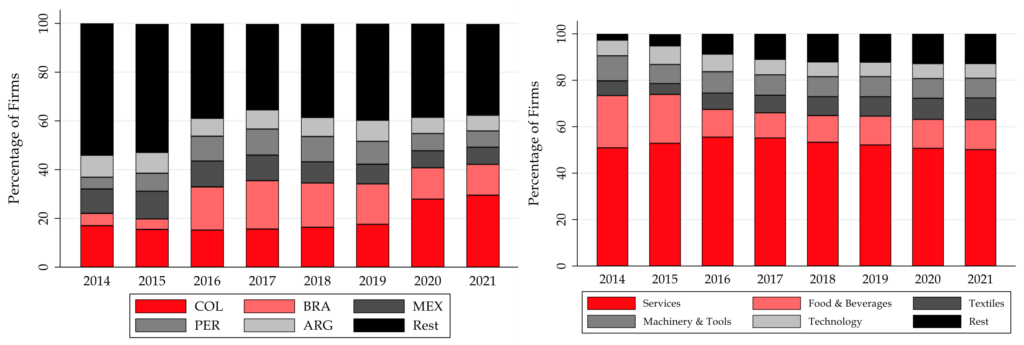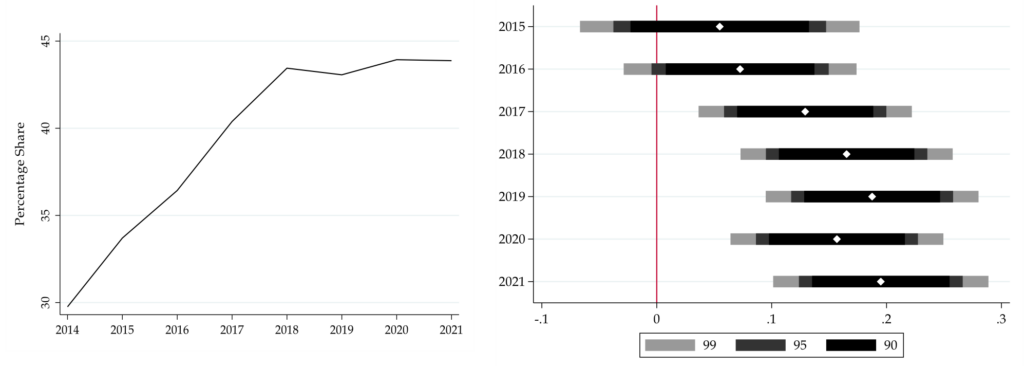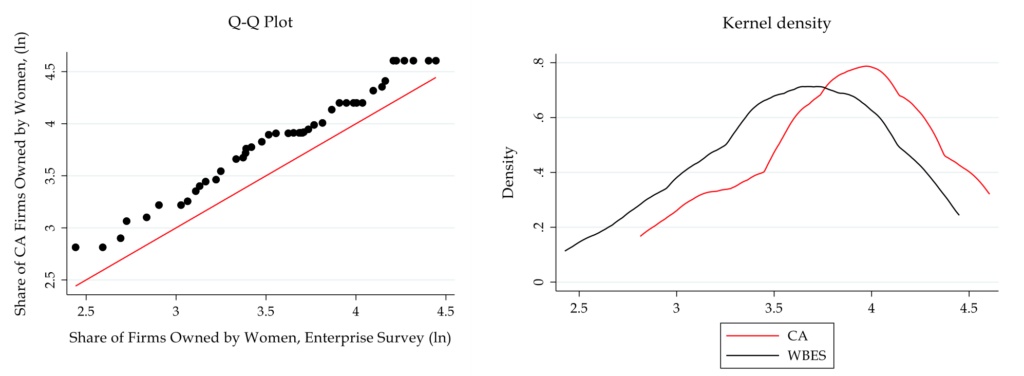Can online platforms expand female-owned firms’ trade opportunities? Based on research using data from a business site in Latin America and the Caribbean, the answer is yes. This finding is important for the promotion of gender equality, one of the 17 Sustainable Development Goals (SDGs), and for the policymakers, practitioners, and researchers who are increasingly interested in understanding the implications of international trade across genders.
Recent evidence suggests that women and men are affected differently by trade and, significantly, by trade barriers and their policies. Given the fast growth of the digital economy in general and e-commerce in particular, this leads to the question of whether and how digital platforms can modify the equation in favor of women.
This blog provides first insights into this issue by examining the evolution and patterns of firms’ ownership by gender using as a case study the online business platform ConnectAmericas, created by the Inter-American Development Bank (IDB) to help Small and Medium Enterprises (SMEs) access international markets. The analysis reveals that the platform has favored female participation: the percentage share of female-owned firms increased from 30% in 2014, when ConnectAmericas was launched, to nearly 45% in 2021. In addition, these businesses are more prevalent than expected based on the overall share of female-owned firms in the respective countries and sectors in Latin America and the Caribbean (LAC).
ConnectAmericas: A large and growing online business platform
Since ConnectAmericas started to operate at the beginning of 2014, the number of registered firms increased on average 82.6% per year to top 143,854 in 2021, from a total of 175 countries (figure 1).[1]
Figure 1
Total Number of Registered Firms and Total Number of Countries with Firms in ConnectAmericas, 2014-2021

Companies from countries around the world can join ConnectAmericas. However, since it was purposely created to favor the internationalization of LAC-based businesses, these countries account for the largest numbers of firms: Colombia, Brazil, Mexico, Peru, and Argentina (figure 2, left panel).
Figure 2
Total Number of Firms in ConnectAmericas, by Country and Sector, 2021

Services, food and beverages, and textiles, jewelry, and accessories are the sectors in which most ConnectAmericas companies operate (figure 2, right panel). This holds true even relative to their size as proxied by their total number of employees or firms.[2] Examples of specific services companies sell are accounting, legal, insurance, and distribution. Food and beverage products consist, for instance, of legumes, vegetables, fruits, and liquors and spirits. Finally, textiles, jewelry, and accessories include fabric (cotton, silk, linen), jeans, jackets, gloves, necklaces, eyewear, and belts.
Women-owned firms increased by almost 20 percentage points
In absolute terms, the percentage share of ConnectAmericas’ firms owned by women went from 30% in 2014 to almost 45% in 2021 (figure 3, left). Different countries and sectors are associated with varying levels of gender equality. However, even after accounting for these across country and sector differences (as in the previous figures), the presence of female-owned companies in ConnectAmericas increased by almost 20 percentage points over the period mentioned above (figure 3, right). This could be at least partially related to the dedicated initiatives ConnectAmericas designed and implemented to promote the participation of women-owned firms, including “ConnectAmericas for Women” and, more recently, its “Woman Growing Together in the Americas” program.[3]
Figure 3
Percentage Share of ConnectAmericas’ Firms Owned by Women, 2014-2021

Note: The figure on the right is based on a regression of an indicator of firms’ ownership by gender on country-sector fixed effects –which accounts for the asymmetric distribution of firms across countries and sectors– and year fixed effects. The diamonds correspond to the estimated coefficients on the year variables and the bars around them the respective confidence intervals at alternative levels (90%, 95%, and 99%).
Women-owned firms are more prevalent online than in relevant offline benchmarks
In 2021, the percentage share of women-owned ConnectAmericas’ firms ranged from 30% in Haiti to approximately 50% in the Bahamas, Bolivia, Costa Rica, Ecuador, Nicaragua, and Trinidad and Tobago, among LAC countries (figure 4).
Figure 4
Percentage Share of ConnectAmericas’ Firms Owned by Women, by Country, Absolute Levels, 2021

These shares are systematically larger than the overall female ownership shares across countries (figure 5). To be more precise, the share of women-owned firms in the digital platform is consistently more extensive than the share of companies owned by women in each country’s economy as a whole.[4]
Figure 5
Percentage Share of ConnectAmericas’ Firms Owned by Women vs. Overall Share of Firms Owned by Women, across Countries

Arguably, these differences in the relative importance of female-owned firms across countries could potentially reflect differences in their sectoral structures as reflected in ConnectAmericas and Enterprise Surveys. This, however, does not seem to be the case. The shares of businesses whose owners are female in ConnectAmericas are larger than those in the Enterprise Surveys, even in the same countries and the same sectors. According to the latter, this holds both overall and for those registering exports (figure 6).
Figure 6
Percentage Share of CA Firms Owned by Women vs. Overall Share of Firms Owned by Women, across Country-Sectors, Selected Countries

Digital platforms can play an important role in making trade more gender-equal
Combined with that reported in recent studies, the evidence presented here suggests that the costs of accessing digital trade platforms could be more symmetrically distributed across gender than traditional direct trade costs. By significantly favoring the participation of female-owned firms in a trade platform that reduces information and search costs, ConnectAmericas has the potential to contribute to increasing export possibilities for female-owned firms both across countries and sectors.
Digital platforms can therefore play an important role in making trade more gender equal. Trade promotion agencies’ purposefully designed programs and activities to take advantage of the opportunities created by digital technologies in general, and for women, in particular, can work similarly. In this line, several LAC countries have already launched dedicated digital business platforms with assistance from the IDB and ConnectAmericas, including Colombia (Compra lo nuestro), Panama (PROPANAMA Conecta), Mexico (ComerciaMX), Paraguay (Paraguay Export), and Ecuador (Ecuador Mi Opción).
These platforms can also help countries gather detailed data disaggregated by gender –thereby complementing the more general efforts needed in this regard—and in having a more agile communication with female-owned firms to promptly identify the specific barriers they face. These data are crucial inputs to produce comprehensive and accurate diagnoses of these companies, conduct research on relevant gender and trade issues, and perform impact evaluations of women-focused trade programs. All of these are required to make evidence-based decisions and thus design and implement more effective policies in this area.
Gender and inclusion remain critical issues in LAC today. The agenda for promoting gender equality in the public sector is broad, and it includes a variety of policy actions and training opportunities. The IDB Group will continue to support this agenda as one of its five priority development pillars under Vision 2025, a plan for LAC’s recovery and sustainable growth.
[1] The number of countries corresponds to that with at least one firm on the platform. The number of unique users reached over 420,000.
[2] Data on the number of employees and total number of firms at the country-sector level are from the International Labor Organizations (ILO) and the World Bank’s Enterprise Survey.
[3] In a separate note, we will focus on these initiatives and show how they have affected the engagement of female-owned firms.
[4] Data on the number and share of women-owned firms at the country-sector level are from the World Bank’s Enterprise Survey.


Leave a Reply